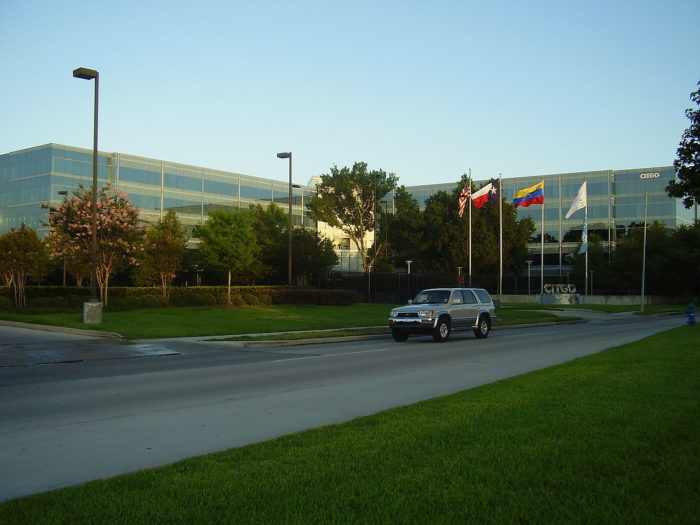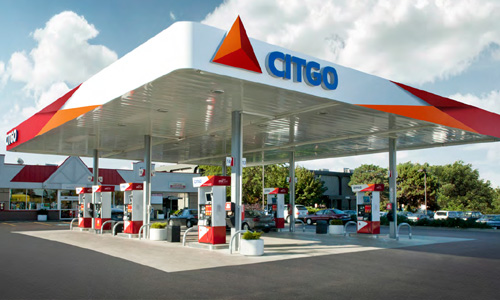Venezuela, whose economy is already in dire straits thanks to US sanctions and its own mismanagement, risks losing control of the Texas-based oil company CITGO, currently owned by Petróleos de Venezuela, and valued at US$8 billion. Bond-holders, the Trump administration and a Canadian mining company are circling the prey. The only, slim chance seems to be if the government of Nicolás Maduro and the opposition leader Juan Guaidó can reach an agreement to save one of their country’s crown jewels.
This is an edited version of the author’s original article (dated 28 May), translated and with additional material by Verónica Menargues Soriano.
A series of podcasts by the author about the economic situation in Venezuela can he heard here.
CITGO is a Texas-based oil refining conglomerate owned by Petróleos de Venezuela SA (or PDVSA), a Venezuelan state oil and natural gas company. The refining subsidiary has the capacity to process 745,000 barrels of crude oil per day, making CITGO the third largest independent refiner in the US, and so the crown jewel of Venezuela’s economy. It has 3,500 employees, 48 terminals, 9 pipelines and a network of 5,000 petrol stations. Its value is estimated at eight billion dollars, which explains why it is targeted by PDVSA creditors and the government of Venezuela, which intends to pay off its outstanding debt using CITGO shares.

On 28 January 2019, pursuant to Executive Order 13850 1)Executive Order (E.O.) 13850: ‘Blocking Property of Additional Persons Contributing to the Situation in Venezuela’ – more information here, the US Treasury Department declared that PDVSA was subject to the US economic sanctions issued by President Donald Trump on 1 November 2018. Consequently, all PDVSA property and interests in property subject to US jurisdiction are blocked, and US persons are banned from engaging in transactions with the company 2)US Department of the Treasury, 28 January 2019.
The sanctions imposed on the state-owned company PDVSA are an attempt to undermine President Nicolás Maduro’s regime and stem his activities which the US administration deems to be illicit. In the words of the US Treasury Secretary, Steve Mnuchin, they ‘will help prevent further diverting of Venezuela’s assets by Maduro’, while supporting the opposition leader Juan Guaidó, recognized by the US and 57 other countries as interim president of Venezuela.
The picture, however, is even more complicated. PDVSA 2020 bonds went into default on 28 October 2019 due to non-payment of a $913 million instalment, which had as collateral 50.1% of CITGO shares. Now the bondholders are entitled to full debt relief equivalent to $1.7 billion and will also be allowed to seize the collateral from 22 July 2020. This will mean that Venezuela will lose control of CITGO the social and economic recovery of the country will be hindered.
To add to the difficulties, there is yet another claimant for the assets of CITGO. The Canadian gold mining company Crystallex is claiming damages of $1.4 billion for Venezuela’s ‘unlawful’ expropriation of the Las Cristinas gold mining operation back in April 2008. Although Crystallex is not a PDVSA creditor and their claim is against the Venezuelan state, the US legal framework allows for the so-called alter ego doctrine 3)“The doctrine whereby the court finds a corporation lacks a separate identity from an individual or corporate shareholder, resulting in injustice to the corporation’s debtors” – Cornell Law School, Legal Information Institute which gives creditors the right to seize the assets of a company when its owner fails to pay an outstanding debt.
According to Crystallex, the Venezuelan government is the alter ego of PDVSA. In other words, PDSVA and the state of Venezuela are essentially one and the same, and so Crystallex should be able to seize CITGO’s shares to collect on the unpaid arbitration award. This interpretation has recently been supported by Chief US District Judge Leonard Stark, who last May ordered the liquidation of CITGO. However, this court order has been suspended until Crystallex gets a license from the US Treasury Department’s Office of Foreign Assets Control (OFAC) in accordance with Executive Order 13384, which prohibits the seizure of Venezuelan assets without OFAC’s authorisation.
OFAC had previously shielded CITGO from creditors until 22 January 2020, and five months ago decided to extend this protection until 22 April. However, this is no guarantee that CITGO will not be liquidated. Shares will be sold once the US sanctions are lifted or whenever OFAC decides to grant a license for its assets to be sold off in order to pay the outstanding debt.
If the estimated value of CITGO is $8 billion, 50.1 per cent of the subsidiary shares could be sold for a total of $4 billion. This would be enough to pay $1.7 billion to the PDVSA 2020 bondholders and $1.4 billion to Crystallex, which comes to a total of $3.1 billion. Even though PDVSA would lose control of CITGO, it would still retain the remaining $900 million and hold 49.9% of the shares. However, there is a risk that CITGO’s real value may be underestimated in the appraisal and its shares will be auctioned off for well below their real price.
Regardless of Venezuela’s humanitarian crisis, CITGO’s liquidation is only a matter of time. No effective measures have been taken to avert it. If the government and the opposition do not reach an agreement, Venezuela will lose CITGO when OFAC grants a licence for its assets to be sold off, or whenever the political situation changes, sanctions are lifted and money-grabbers start competing for the rubble of a broken country.
What can be done? There is a need for Maduro and Guaidó to agree a truce and come up with a common strategy to safeguard PDVSA assets. One thing is clear, whoever eventually governs Venezuela will need this US-based refining conglomerate in order to rebuild the nation. Therefore, as a matter of urgency, they must request a new resolution from the United Nations that will protect the assets of their crisis-torn country from predatory creditors.
Stop Press: it was reported on 1 June that the Maduro government had reached an agreement with opposition leader Juan Guaidó to co-operate for the good of the country to fight the Covid-19 pandemic. The agreement does not mention CITGO, but at least it raises hope that the two leaders may be able to extend their co-operation to an issue with vast implications for the country’s economic survival.
References
| ↑1 | Executive Order (E.O.) 13850: ‘Blocking Property of Additional Persons Contributing to the Situation in Venezuela’ – more information here |
|---|---|
| ↑2 | US Department of the Treasury, 28 January 2019 |
| ↑3 | “The doctrine whereby the court finds a corporation lacks a separate identity from an individual or corporate shareholder, resulting in injustice to the corporation’s debtors” – Cornell Law School, Legal Information Institute |

